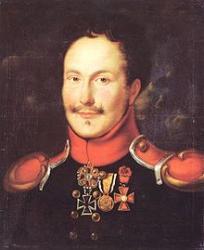
1777 - 1843 Author of "My Savior, What Thou Didst of Old" Fouqué, Friedrich Heinrich Carl de la Motte, was born Feb. 12,1777, at Brandenburg on the Havel, where his father, of an ancient and noble Huguenot family, was a retired officer of dragoons. Educated under the training of the French Reformed Church, it was intended that he should enter the University of Halle as a student of law. By his own preference however he entered the army, and in 1794 was appointed cornet in the Duke of Weimar's regiment of cuirassiers. In 1803 he married and retired to Nennhausen near Rathenow, Brandenburg. When, in March, 1813, the King of Prussia invited his people to arm against France, Fouqué offered himself as a volunteer and served as a lieutenant of cavalry till he was disabled at the battle of Lützen, May 2, 1813, and with the rank of major retired once more to Nennhausen. After the death of his wife, in 1831, he resided for some time at Halle, where he gave lectures in the University on the history of poetry; and finally settled in Berlin, where, two days after a stroke of apoplexy, he died Jan. 23,1843 (Koch, vii.6-20; Allgemeine Deutsche Biographie, vii. 198-201, &c).
Fouqué is best known as one of the leaders of the "Romantic" school of German literature, and by his wonderfully successful efforts to make the best features of the knight and minstrel life of the 12th century, live again in the pages of his romances as an example and incitement to his own times. His fame rests not on his poems, but on his romances, especially that of Undine (1st ed. Berlin, 1811, 17th ed. 1870—frequently translated into English). His hymns, while affording a true and thought¬ful reflex of his religious feelings, cannot be said to have either great depth of Christian experience or genuine churchly ring, and hardly any have come into Church use in Germany. He himself only published 15 Mission hymns at Leipzig, 1822, as Geistliche Lieder, Erstes Bandchen. From his papers his second wife issued two collections, the Geistliche Gedichte, Berlin, 1846, and Christlicher Liederschatz, Berlin, 186', but they contain few compositions that can be called hymns, and of these hardly any are suitable for church use.
Of his hymns those translated into English are:—
i. Was du vor tausend Jahren. Christ our Light. Founded on St. Mark x. 46-52, and included 1846, p. 1, in 6 stanzas of 8 lines, entitled, "The Faithfulness of the Saviour." Previously in Bunsen's Versuch, 1833, No. 761. Translated as:—
A thousand years have fleeted, a good and full translated by Miss Cox in her Sacred Hymns from the Germans, 1841, p. 105, repeated, omitting stanzas ii.-iv., as No. 567 in Hedge and Huntington's Hymns for the Church of Christ, Boston, U.S., 1853.
Other translations are: (1) "Thy mercy, Lord, is still the same," by Lady E. Fortescue, 1843. (2) "My Saviour, what Thou didst of old," by Miss Winkworth, 1855, p. 53.
His hymns not in English common use are:—
ii. In die Segel sanft und linde. Missions. 1822, p. 13, in 4 stanzas entitled “Prosperous Voyage," i.e. to the mission field. Translated as "In our sails all soft and sweetly," by Miss Winkworth, 1858, p. 115.
iii. Wie schäumt so feierlich zu unsern Füssen. Missions. For missionaries about to set out on their voyage. 1822, p. 11, in 8 stanzas, entitled "At the Sea." The translations are: (1) "Thou solemn Ocean, rollest to the strand," by Miss Winkworth, 1858, p. 112. (2) "Dark, mighty Ocean, rolling to our feet," by Miss Borthwick, in Hymns from the Land of Luther , 1858, p. 26, repeated in L. Rehfuess's Church at Sea, 1868, p. 5. [Rev. James Mearns, M.A.]
--John Julian, Dictionary of Hymnology (1907)
Friedrich Heinrich Karl, Freiherr de La Motte-Fouqué


 My Starred Hymns
My Starred Hymns



